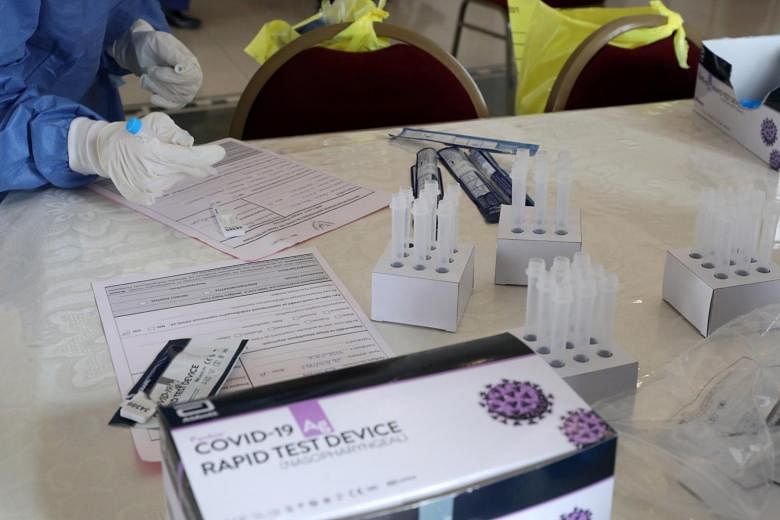GENEVA (BLOOMBERG) - Even the tens of millions of Covid-19 tests Roche Holding AG is churning out won't be enough this winter as infections surge across the northern hemisphere, says chief executive officer Severin Schwan.
The Swiss giant is on pace to produce more than 80 million rapid antigen tests a month by the end of this year, along with the slower but highly accurate PCR tests that it's been delivering globally since January.
But even that will fall short of demand amid continuing supply bottlenecks, so health officials will have to keep prioritising resources.
"We could sell much more if only we had the supplies," Mr Schwan said in an interview with Bloomberg News. "These are very complex systems, and you need a lot of stuff to come together."
That will also be the dynamic for the Covid-19 antibody cocktail therapy Roche is helping develop, which could get regulatory approval "very soon," Mr Schwan said.
The following excerpts from the interview have been condensed and edited.
Q: What exactly does the market for coronavirus tests look like for you?
A: Demand is by far outstripping supply, and that's true both for PCR and for antigen tests. I expect this to continue for quite some time into 2021, and it's simply because we have huge back orders, which give you enough line of sight.
You have long, complicated supply chains, so you have to work on the bottlenecks simultaneously with all your suppliers, and with your internal setup, and this changes over time.
Q: What, exactly, is in short supply?
A: If you've fixed one bottleneck, then you have another bottleneck, because as long as you're on back orders, there's always one bottleneck. It can be consumables, or it can be extraction materials, or it can be plastic parts, or it can be glass which you need.
You discover all kinds of things that you wouldn't even have thought about during normal circumstances. Because the system is so stressed, things which you always took for granted are suddenly in short supply.
Q: On the therapies front, Roche is helping develop and manufacture Regeneron Pharmaceuticals Inc.'s highly promising two-antibody "cocktail." How widely accessible would this therapy be?
A: We expect to produce about 2 million doses, so the demand will outstrip the supply by multiples. Governments and healthcare systems need to be very thoughtful about where to prioritize these antibody cocktails.
You have to target it to those people where the mortality risk is highest. If we get it to the right patients, we could really significantly lower mortality.
One possible scenario is that you triage patients who show up with an infection according to risk factors. You'd rather treat them early than wait until they get into a critical stage, because at that time, an antibody therapy probably won't help so much.
Q: There's been encouraging vaccine data recently from Pfizer and BioNTech, and also from Moderna. How quickly do you expect Covid vaccines to scale up?
A: I hope we'll see vaccines being made available in the first half of the year, being targeted to higher-risk patient populations - healthcare workers, for example - and then broadening access over the second half of the year.
That will have an impact on how the pandemic evolves, and that will determine the demand for tests on one hand and therapeutics on the other.
But we have to see how willing populations are to get vaccinated, and how effective the vaccines are across different parts of the population. There are still unknowns here. Finally, to really scale vaccines up for the world, so to speak, will take more time.
Q: The two leading vaccine candidates use messenger-RNA technology, which is a clinical breakthrough for the approach. Do you think mRNA will have a big impact on other types of diseases?
A: What's clear is that mRNA can intervene and trigger something in the immune system. So it potentially has a role wherever the immune system plays a role. That's obviously the case for cancer, and maybe other areas like neurology, central nervous system, autoimmune and infectious diseases.
But you have to be careful about saying, 'We can just copy-paste things.' We know from experience that doesn't work. It will take years before we will make this technology work for broader patient populations across different diseases.











